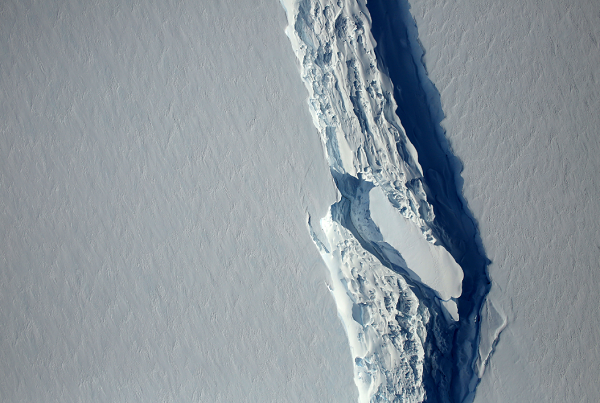
For the past month, scientists have been expecting a large portion of the Larsen C ice shelf to break off of the Antarctic Peninsula, the most prominent peninsula in Antarctica. Sometime between Monday and Wednesday, the trillion-ton giant iceberg about the size of the Delaware finally separated from the Larsen ice shelf. Researchers discovered the iceberg had broken off after analyzing satellite data of the area, according to The Guardian.
The break was a long time coming. From 2011 to 2015, the crack had expanded by over 18 miles. In early 2017, the split had grown over 11 miles. In June researchers discovered the crack had continued to grow by another 11 miles. The split is widely viewed as a consequence of climate change.
Now that the iceberg has finally "calved," or broken off, Larsen C—the long ice shelf that extends along the east coast of the Antarctic Peninsula out into the northwestern Weddell Sea in the Southern Ocean—is estimated to be 12 percent smaller area than before.
While the 2,200-mile-long iceberg is currently drifting in the Weddell Sea, satellite data of the landscape from just days before it broke off the ice shelf revealed multiple branches, highlighting weak points within the iceberg. Scientists believe the iceberg, which is expected to be named A68, will continue to break.
"We see one large [iceberg] for now. It is likely that this will break into smaller pieces as time goes by," Adrian Luckman, professor of glaciology at Swansea University, told the Guardian.
If it were to melt, the new iceberg likely wouldn't raise the sea level by more than a few millimeters. Antarctic waters have enough ice that the melted iceberg wouldn't have that much impact. But how the massive break will alter Larsen C is a source of concern. The ice shelf could collapse the following stress of birthing a new iceberg, or some of the newly exposed areas of the shelf could continue to break off.
Larsen C Ice Shelf was 4th largest ice shelf in the world (48,600 km²); having just lost 12% of its total area, it’s now the 5th largest pic.twitter.com/YJjgrARFSa
— The Antarctic Report (@AntarcticReport) July 12, 2017
Chis Borstad, a glaciologist at the University Center in Svalbard, Norway, told Science Magazine that dormant cracks—previous cracks that formed in the Larsen C but hadn't extended—could be revived now that a new area of the shelf is exposed. Such a change would only further endanger the ice shelf. "If any of these begin to grow, they could be much more problematic to the stability of the shelf," he said.
Other researchers suggested that the remaining portion of the Larsen C ice shelf could stay stable. New ice could develop where the iceberg broke off over time, allowing the Larsen C to remain in place for a number of decades.
According to PBS, the new iceberg could create greater risks for mariners sailing in the South Atlantic, where the new mass is likely headed.
The last time a portion of the Larsen ice shelf broke off was in 2002 when an iceberg calved off Larsen B, a more northern portion of the Larsen ice shelf along the Antarctic Peninsula.
Uncommon Knowledge
Newsweek is committed to challenging conventional wisdom and finding connections in the search for common ground.
Newsweek is committed to challenging conventional wisdom and finding connections in the search for common ground.
About the writer
Michigan native, Janice Williams is a graduate of Oakland University where she studied journalism and communication. Upon relocating to New ... Read more
To read how Newsweek uses AI as a newsroom tool, Click here.








